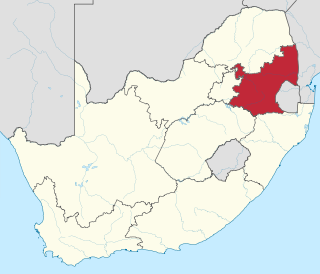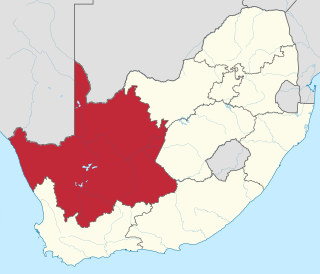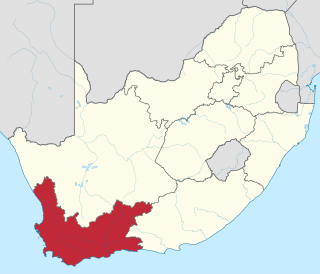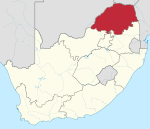
Eastern Cape is one of the nine multi-member constituencies of the National Assembly of South Africa, the lower house of the Parliament of South Africa, the national legislature of South Africa. The constituency was established in 1994 when the National Assembly was established by the Interim Constitution following the end of Apartheid. It is conterminous with the province of Eastern Cape. The constituency currently elects 25 of the 400 members of the National Assembly using the closed party-list proportional representation electoral system. At the 2019 general election it had 3,363,161 registered electors.

Free State is one of the nine multi-member constituencies of the National Assembly of South Africa, the lower house of the Parliament of South Africa, the national legislature of South Africa. The constituency was established as Orange Free State in 1994 when the National Assembly was established by the Interim Constitution following the end of Apartheid. It was renamed Free State in 1999. It is conterminous with the province of Free State. The constituency currently elects 11 of the 400 members of the National Assembly using the closed party-list proportional representation electoral system. At the 2019 general election it had 1,462,508 registered electors.

Gauteng is one of the nine multi-member constituencies of the National Assembly of South Africa, the lower house of the Parliament of South Africa, the national legislature of South Africa. The constituency was established as Pretoria–Witwatersrand–Vereeniging in 1994 when the National Assembly was established by the Interim Constitution following the end of Apartheid. It was renamed Gauteng in 1999. It is conterminous with the province of Gauteng. The constituency currently elects 48 of the 400 members of the National Assembly using the closed party-list proportional representation electoral system. At the 2019 general election it had 6,381,220 registered electors.

KwaZulu-Natal is one of the nine multi-member constituencies of the National Assembly of South Africa, the lower house of the Parliament of South Africa, the national legislature of South Africa. The constituency was established in 1994 when the National Assembly was established by the Interim Constitution following the end of Apartheid. It is conterminous with the province of KwaZulu-Natal. The constituency currently elects 41 of the 400 members of the National Assembly using the closed party-list proportional representation electoral system. At the 2019 general election it had 5,524,666 registered electors.

Mpumalanga is one of the nine multi-member constituencies of the National Assembly of South Africa, the lower house of the Parliament of South Africa, the national legislature of South Africa. The constituency was established as Eastern Transvaal in 1994 when the National Assembly was established by the Interim Constitution following the end of Apartheid. It was renamed Mpumalanga in 1999. It is conterminous with the province of Mpumalanga. The constituency currently elects 15 of the 400 members of the National Assembly using the closed party-list proportional representation electoral system. At the 2019 general election it had 1,951,776 registered electors.

Northern Cape is one of the nine multi-member constituencies of the National Assembly of South Africa, the lower house of the Parliament of South Africa, the national legislature of South Africa. The constituency was established in 1994 when the National Assembly was established by the Interim Constitution following the end of Apartheid. It is conterminous with the province of Northern Cape. The constituency currently elects five of the 400 members of the National Assembly using the closed party-list proportional representation electoral system. At the 2024 general election it had 656,826 registered electors.

North West is one of the nine multi-member constituencies of the National Assembly of South Africa, the lower house of the Parliament of South Africa, the national legislature of South Africa. The constituency was established in 1994 when the National Assembly was established by the Interim Constitution following the end of Apartheid. It is conterminous with the province of North West. The constituency currently elects 13 of the 400 members of the National Assembly using the closed party-list proportional representation electoral system. At the 2019 general election it had 1,702,728 registered electors.

Western Cape is one of the nine multi-member constituencies of the National Assembly of South Africa, the lower house of the Parliament of South Africa, the national legislature of South Africa. The constituency was established in 1994 when the National Assembly was established by the Interim Constitution following the end of Apartheid. It is conterminous with the province of Western Cape. The constituency currently elects 24 of the 400 members of the National Assembly using the closed party-list proportional representation electoral system. At the 2024 general election it had 3,317,072 registered electors.
The Saldanha Bay Local Municipality consists of twenty-seven members elected by mixed-member proportional representation. Fourteen councillors are elected by first-past-the-post voting in fourteen wards, while the remaining thirteen are chosen from party lists so that the total number of party representatives is proportional to the number of votes received. In the election of 1 November 2021 the Democratic Alliance (DA) obtained a plurality of thirteen seats on the council.
Letsau Nelson Diale was a South African politician and anti-apartheid activist from Limpopo. He joined the African National Congress (ANC) in 1956 and served eight years' imprisonment on Robben Island, from 1964 to 1972, for his work with Umkhonto we Sizwe. After the end of apartheid, he represented the ANC in the National Council of Provinces from 1994 to 1999 and in the National Assembly from 1999 to 2014.
Tovhowani Josephine Tshivhase is a South African politician who represented the African National Congress (ANC) in the National Assembly from May 1994 until January 2011, when she resigned. She is a former chairperson of the assembly's Portfolio Committee on Social Development.
Tshiwela Elidah Lishivha, also known as Elda Leshika, is a South African politician who represented the African National Congress (ANC) in the National Assembly from 1999 to 2014. She was first elected in the 1999 general election, serving the Limpopo constituency. She was narrowly re-elected to the Limpopo caucus in 2004, and she was re-elected in 2009 off the ANC's national party list. During her third term in the assembly, she was a member of the Portfolio Committee on Sport and Recreation.
Piet Mohlamme Mathebe was a South African politician and the traditional leader of Limpopo's Bantwane tribe. Known in the later capacity as Mohlamme III, he led the tribal authority from 1992 until his death in 2020.
Koena Arthur Moloto is a South African politician and businessman who represented the African National Congress (ANC) in the National Assembly from 1999 to 2009 and from 2010 to 2014. He also chaired the Government Employees Pension Fund from 2009 to 2014.
Chief Kgoloko Walter Morwamoche was a South African politician and Pedi traditional leader. He represented the African National Congress (ANC) in the National Assembly from 1999 to 2009, serving the Limpopo constituency.
Helen Flora Matlanyane, formerly known as Helen Malebana, is a South African politician from Limpopo. She served two non-consecutive terms in the National Assembly, from 1999 to 2004 and from 2009 to 2014, and in the interim she served in the National Council of Provinces from 2004 to 2009. She is a member of the African National Congress (ANC).
Frans Tlokwe Maserumule is a South African politician and former anti-apartheid activist. He represented the African National Congress (ANC) in the National Assembly, serving the Limpopo constituency, from 1999 to 2009 and later from 2010 to 2014.
Nomvula Frieda Mathibela is a retired South African politician from Limpopo. She represented the African National Congress (ANC) in the National Assembly from 2004 to 2014.
Constance Nkuna is a South African politician from Limpopo. She represented the African National Congress (ANC) in Parliament from 1999 to 2009.
Motswaledi Hezekiel Matlala is a South African politician from Limpopo. He represented the Limpopo constituency in the National Assembly for two non-consecutive terms from 2004 to 2009 and from 2014 to 2019. He is a member of the African National Congress (ANC).








